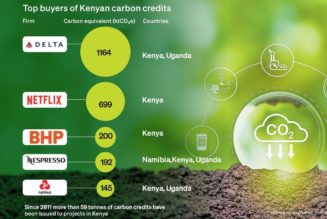Columnists
The emerging Cold War is diverting attention from global climate agenda
Friday August 25 2023

COP 26 in Glasgow word cloud concept. PHOTO | SHUTTERSTOCK
Climate action is apparently no longer the urgent global priority last displayed with near unanimity at the November 2021 COP26 forum in Glasgow.
Global climate focus was thrown into disarray a few months later in February 2022 when Russia invaded Ukraine.
Since then, the Global North has pushed its climate agenda to a lower tier, mainly focusing on its own energy security, economic stability, and above all a resurgent geopolitical competition that mirrors the Cold War of yesteryears.
Global leadership summits no longer have climate threat as a key agenda. The Camp David summit last week was about security and military cooperation, and climate is unlikely to feature prominently at the ongoing BRICS summit in South Africa.
With the top global political leadership preoccupied with geopolitics, the oil-producing companies and countries are by default now influencing the direction and pace of the energy transition with diversionary cliches like carbon storage, carbon trading and all manner of ESG programmes.
It is worth noting how the hosting of COP forums is progressively being pushed to the developing world. The ongoing West/East geopolitical paralysis cannot guarantee full attendance of COP forums in the Global North capitals.
Although carbon emissions by the developing world are relatively minimal, the region has apparently accepted to sustain the climate rhetoric as the Global North engages in cold war geopolitics.
Kenya has disproportionately contributed more than its equitable share of global climate effort, especially in respect of renewables.
The country can now rightly approach incremental climate efforts and actions as value-adding economic opportunities.
Renewable energy (geothermal, wind, solar, hydro ) reduces dollar energy imports, as the country achieves energy security and self-sufficiency with locally produced energy.
I have always supported local oil and coal production as long as these reduce import costs of the same. Similarly, a rapid transport electrification programme will accelerate the reduction of oil imports.
Forestry and tree planting entrench Kenya’s water security through preservation and regeneration of water towers while supporting timber and paper economic sectors.
Additionally, agroforestry enhances food security, fruit exports, and agro-industrialisation.
Kenya should readily embrace green investments and funding in whatever form (investments, projects, programmes, grants, etc.) as long as these add real socio-economic value. And when we work through these economic opportunities , we are concurrently delivering climate solutions.
It is all about economic pragmatism. It is indeed negligent for the global political leadership to immerse in geopolitical competition when the world is visibly suffering from costly global warming impacts — heatwaves, wildfires, droughts, and floods.
George Wachira, Petroleum consultant, [email protected]









